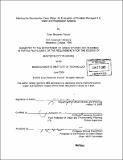Meeting the mandate for clean water : an evaluation of privately managed U.S. water and wastewater systems
Author(s)
Freund, Evan Benjamin
DownloadFull printable version (8.608Mb)
Other Contributors
Massachusetts Institute of Technology. Dept. of Urban Studies and Planning.
Advisor
Lawrence Susskind.
Terms of use
Metadata
Show full item recordAbstract
Reliable provision of clean and safe drinking water is critical for public health, economic stability and growth in the United States. Due to a combination of financial, regulatory and operational challenges, however, it is becoming increasingly difficult for publicly owned and operated water utilities to provide affordable and safe water along with efficient service delivery. Since the 1980's, new actors have entered the U.S. water utility scene in the form of large international firms that specialize in water utility management, offering the opportunity to increase efficiency, expedite long-delayed maintenance, minimize rate increases and provide needed capital for system expansion. Private management of water and wastewater systems, however, can have unintended and negative consequences on localities, including: * The loss of employment and pensions for the municipal utility work force; * Higher water rates because private firms charge full cost, must pay taxes and earn a profit; * Surrender of local control over ratemaking and other financial issues to state public utility commissions; * Loss of municipal control of daily operations and the setting of service standards, as well as loss of control over planning for long-term growth and economic development. (cont.) The intent of this thesis is to evaluate the effects of adopting long-term operations and management contracts for water and wastewater services in three U.S. cities. The central assertion of this thesis is that such contracts between municipal governments and private water and wastewater providers are financially risky endeavors that invite labor disputes, generate municipal budget conflicts, threaten water quality and undercut the reliability of customer service. Evidence from the three cities examined also suggests that the risks (i.e., increases in the number of violations of water quality standards, decreases in actual preventative maintenance and lower-than expected financial savings) outweigh the presumed returns offered by long-term contracts with provide providers (namely financial savings, improvements in customer service, and improvements in water quality). Finally, this study also examines the concept of competitiveness in water utility management and explores opportunities for public utilities to identify and implement operational improvements without actually privatizing any aspects of network operations and maintenance.
Description
Thesis (M.C.P.)--Massachusetts Institute of Technology, Dept. of Urban Studies and Planning, 2005. Includes bibliographical references (p. 128-133).
Date issued
2005Department
Massachusetts Institute of Technology. Department of Urban Studies and PlanningPublisher
Massachusetts Institute of Technology
Keywords
Urban Studies and Planning.